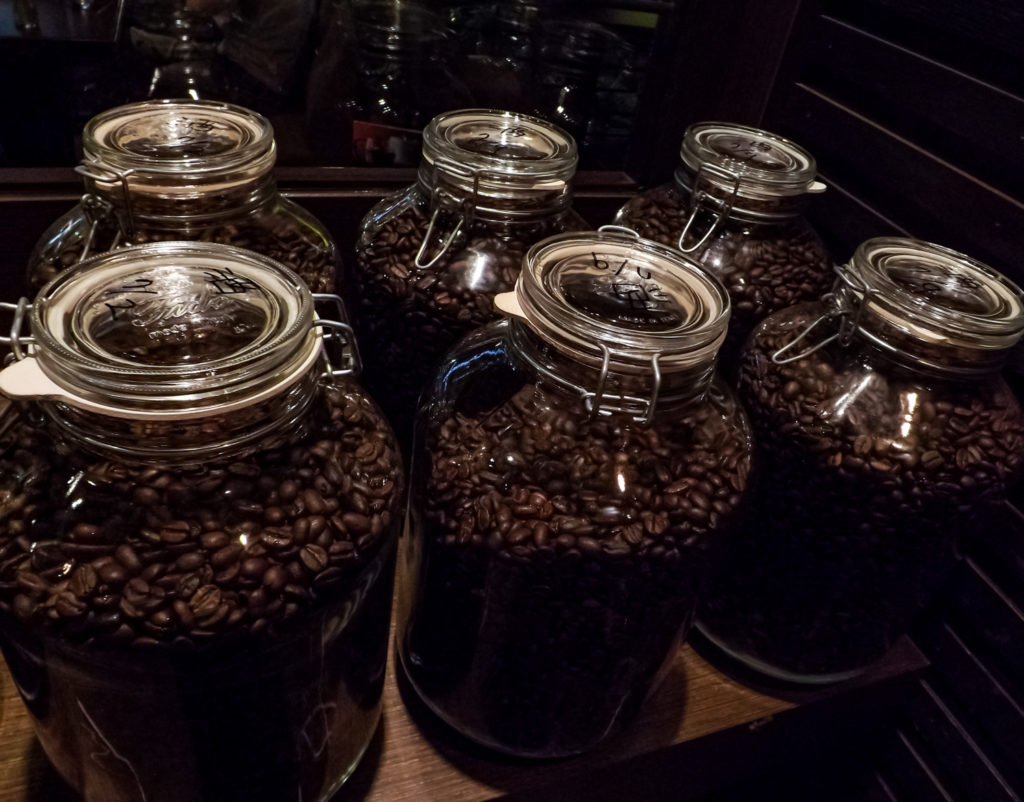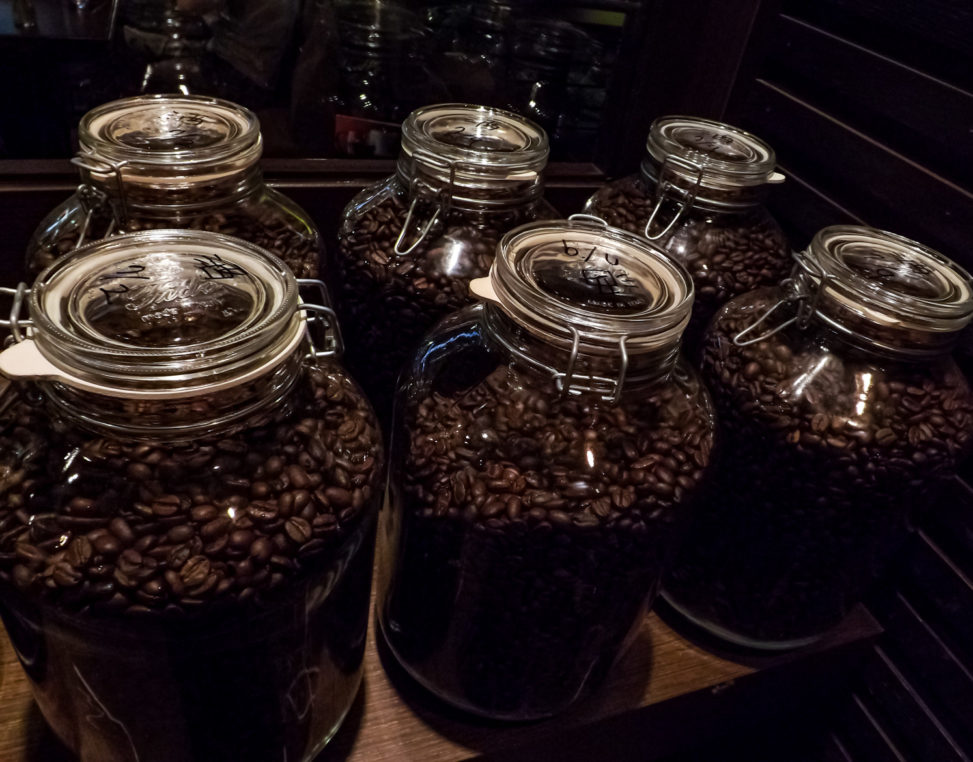Our guide to proper coffee bean storage methods
PurelyCoffeeBeans worries about his coffee bean storage. Are you also losing sleep over how your coffee beans will taste tomorrow? Probably not. But if you don’t, then that’s because you never drank a cup of disgusting brown liquid before. I have …

Coffee storage jars brimming with coffee freshly roasted! (c) 2020 Kenneth Dickson @ PurelyCoffeeBeans
Well, let me tell you, if you take your time to buy good coffee beans, and spend lots of money on buying the best coffee makers, then storing your top quality coffee beans only makes sense because it will save you money, stress and your morning coffee!
Find out more about ways to do proper coffee bean storage by reading about the natural enemies of coffee, different coffee types, why coffee beans go bad, and how you can implement some simple storage remedies to ensure that your coffee tastes as good as you would like it to be.
What will I learn about storing my coffee properly?
- What are coffee’s natural enemies? Think M-A-S-H!
- How long will green coffee beans stay fresh? Green beans vs. roasted beans?
- Is roasting your own coffee worth it?
When good coffee goes bad…
- Why do coffee beans go bad?
- How do you keep coffee fresh after opening?
- Does ground coffee also go bad?
- What do I recommend for proper coffee bean storage?
- Video – How should you store your coffee beans?
Reader’s Question
- Q1. How long can I store coffee beans? What about green coffee beans?
- Q2. Expiration date way over! Can we still drink old coffee beans?
What are Coffee’s Natural Enemies?
There are four natural enemies that impair or destroy the flavors in roasted coffee beans: air, moisture, heat, and sunlight.
Moisture also affects coffee bean storage: keeping your beans dry will help keep them fresh, inhibit the growth of molds or bacteria and the ‘sweating’ process that would occur if they were also exposed to heat or sunlight. Keeping the beans in the refrigerator or freezer also exposes your beans to moisture.
Air is an obvious one: the fresh air will naturally react with the complex chemical composition of the coffee beans, especially the roasted ones. This produces a gradual impairment of the flavor, leaving the beans bland, tasteless, and odorless. In your coffee cup, this means a cup of brown sludge, if you’re lucky. Keep the beans in an airtight container.
Sunlight, too: because of the sunlight, the beans will be gently heated perhaps for prolonged periods, if you leave the coffee jar under the sun. The light itself will also impact the delicate flavors of the coffee beans.
Heat is a natural destroyer of the flavors of coffee beans except when you’re actually preparing your coffee. During the preparation, you use a controlled amount of heat for a specific duration; but exposure to inappropriate heat prior to use will remove some of the flavors you are looking for. Keep your beans cool.
Remember: MASH – moisture, air, sunlight and heat – will destroy your precious (and expensive) coffee beans, so it’s important that you choose appropriate methods for coffee bean storage. And the steps are pretty simple to set up.
But there is one cause of non-remediable source that affects your coffee… can you guess which it is?
Answer: At the bottom of the article.
How long will green coffee beans stay fresh?
Green beans (the unroasted ones) will keep for several years if you put them in a cool, dark and dry coffee bean storage. You will need to make sure that the container is tightly sealed so you can store coffee beans properly. But you should still be able to make a decent roast!
You can vacuum seal unroasted or green coffee beans for future use and keep them for years if you like home roasting. Once they are roasted, though, you should grind them and use them within a few days. Freezing is not recommended because of the inevitable condensation that ruins the flavor of the coffee.
Is roasting your own coffee worth it?
If you’re into roasting your own beans, then you will be able to keep your beans for up to several weeks at room temperatures. Putting them in an airtight container, especially a dark one, will help to preserve the damage the light does to the beans.
Unlike commercially roasted coffee, your own roast should be perfectly drinkable. If you compare to the beans in the supermarket, they often claim use-by dates of upto 2 years! 2 YEARS! Geez!
Unfortunately, green beans don’t make a great cup of coffee when you need it! You still have to roast and grind the beans. In many situations, it’s impossible to roast the beans when you’re on a 10-minute coffee break, for example. This means you need to be prepared, but could become a pleasurable hobby.
But roasted beans are a lot fussier and extended periods in coffee bean storage, even when well-packed, will reduce the flavors in the cup. So you’ll likely end up purchasing freshly (or at least, recently) roasted coffee beans. However, these beans are more volatile if you don’t store the coffee properly.
How do coffee beans go bad?
It is important to store coffee beans well, especially after they have been roasted. Why is that? To understand how delicate your coffee beans’ aroma and taste really are, you should find out how it comes about, what leads to its flavors, and what happens to turn aromas ‘bad’.
Once you roast your coffee beans, the oils that contain the flavors and aromas come are expelled from the bean. You can see this because the oils are visible on the surface of the bean. After a few days without proper coffee bean storage, these aroma-carrying oils turn rancid because of exposure to the air, and the coffee flavor is degraded to the point that you no longer discern the delicate aromas.
Freshly roasted beans also expel gasses that are the product of the roasting process. After about a week, these gasses dissipate so you will have to make sure the carbon dioxide is vented properly, either through special bags or by opening the canister.
Most commercial roasted coffee beans sold is packed in a special bag that allows the gases to escape while preventing oxygen from entering. This bag facilitates proper coffee bean storage, but won’t keep the beans fresh forever.
Once the gasses are vented, the coffee is highly drinkable, but keeping the coffee in tiptop condition becomes a challenge, one that you are destined to lose if it goes on too long.
How do you keep coffee fresh after opening?
The best way for optimum coffee bean storage is keeping the beans in a tightly closed container. There are several kinds of attractive containers that have a strong lock on the lid and a rubber seal but any type of tightly covered jar or can will do as long as you use the beans quickly.
This is the best way to protect the oils of the coffee beans and get the best flavor from your freshly ground and brewed coffee. Also, keep the beans away from MASH – Moisture, Air, Sunlight and Heat! Doing that will help you keep your beans longer and in better condition.
Don’t plan on keeping the beans for three months in a transparent jar with a loose lid, and expect them to retain the same flavors! If you keep the bags small enough to be used within 10 days of opening, store coffee beans that well and your coffee should be fine.
Why does ground coffee go bad?
Yes! All coffee goes bad eventually. Some companies spend a lot of money refining their processing & packaging. There are some methods for storing coffee beans, such as using vacuum coffee containers with nitrogen or one-way valves in foil bags for roasted coffee beans and ground coffee. Other companies throw the beans in bags and hope for the best.
However, whole beans do keep better on the whole! Ground coffee starts to lose all the essentials that matter as soon as it is ground. That is why ground vacuum-packed coffee tends to be so mediocre; the flavors and aromas from the oils have dissipated in the packing and storage processes.
These vacuum containers are excellent for preserving green coffee beans (unroasted) as well as your freshly roasted coffee beans. However, the process of vacuum sealing risks removing some natural smells and flavors from ground coffee. Worse, ground coffee tends to be particularly vulnerable to the MASH symptoms I outlined above, especially after it is opened.
Keep it sealed up!
So, if you are using ground coffee, keep it in a sealed container to prevent additional condensation inside; and use the coffee as quickly as possible. Avoid keeping it in the refrigerator because taking it out daily increases the risk of additional moisture condensing inside the bag.
For beans, some people are suggesting taking larger bags and dosing out each day’s use into smaller bags. Then freezing the smaller bags. Freeze the small bags, take out & grind as normal. Their idea is it will stop additional degradation from the day of initial freezing. Give it a try!
One tip I’m trying now with bags of coffee (both ground & beans): don’t decant the coffee into your own jar from the coffee bag. This just allows air into the entire bag of coffee as you pour. Instead, try to disturb the bottom of the pack unduly by taking what coffee you need from the top, then put the ENTIRE bag (clipped shut) into the coffee jar! That’s what I’m trying nowadays in 2019!
Lastly, I’d suggest you to avoid buying large containers of coffee especially if it can’t be drunk reasonably within a short time. Even keeping it in the fridge will not prevent your coffee from going off shortly.
What do I recommend for proper coffee bean storage?
I don’t store coffee beans in the fridge because I usually buy a large bag, and grind the beans daily. I’m not tempted to put the beans in the refrigerator, because of the risk of creating additional stress on the flavors. I do need to buy a decent coffee can or ceramic jar to protect the coffee from light; and put the beans in a cupboard away from the sun streaming through the kitchen window.
No storage jars with clear glass there. Don’t keep your beans in a glass jar… light gets in! In fact, if the jar is big enough, just put the entire bag with beans inside INTO the jar. Don’t disturb the carbon that has sheathed the beans at the bottom of the bag! That is my current recommendation for storage for short term. When you pour the beans into the jar, the carbon escapes, and is replaced with oxygen leading to increased oxidation and a shorter shelf-life for your coffee!
I’d also recommend that you purchase your beans and try to use them up within about 10-14 days at the very most. If you can’t, you may find that you need to buy smaller quantities of coffee. While this cuts down some of the savings you might make by buying in bulk, your taste buds will thank you a great deal when you buy less and use proper coffee bean storing methods.
Video – How should you store your coffee beans?
Maria Cleaveland, from Equator Estate Coffees, advises us quickly on how to store coffee beans properly in this short video. Worth watching.
At PurelyCoffeeBeans, I’ve answered lots of questions over the years. You’ll find the questions and their answers scattered throughout the site! I’m always open to more questions, if you’re frustrated or curious, or you want to review a coffee, why don’t you drop me a line!
This week we welcome…!
Q1. How long can I store coffee beans? What about green coffee beans?
by a coffee friend from the US
Check out this coffee storage jar on Amazon
If stored in an airtight container designed for effective coffee bean storage, how long will unground beans last before going stale? I know that some beans tend to go stale more quickly, like JBM, but I mean just your typical espresso roasted fare.
Thank you
That’s a great question. In general, the sooner beans of any kind are used the better. Why? Because air, heat, moisture and time (remember M-A-S-H?) are the enemies of ALL coffee. Saying that, however, unground beans will keep longer than ground coffee. So the real question is: how exactly did you store your coffee?
Green coffee vs. roasted coffee?
One website I read suggested from 2 ~10 years (!) but that it would depend on what kind of bean and HOW carefully they were stored. If the container is airtight, store them away from the sun for sure. Green beans typically have a moisture content of 10-15%, so I would be careful about not storing them in plastic bags, since this may incubate undesirables in your beans.
I wouldn’t personally aim to keep green beans longer than 12 months in a hot or humid climate, simply because ambient humidity is much higher where I live. Roasted coffee beans wouldn’t really be so good after even just a month or so, once opened.
I also debate with myself the advantages of storing beans in the freezer, because of the danger of causing mold growth from warm temperatures and increased humidity from sweating’ of roasted beans. If you have a large bag of green beans, do your friends a favor and give them away: well before the 2 years are up!
There are some practical solutions to storing coffee beans well, you can also check them out some appropriate products on Amazon.
Q2. Expiration Date Way Over! Can we still drink old coffee beans?
by Andrew Tan from the Philippines
Good afternoon, sir!
We have in our office a bag of Kirkland coffee beans that we forgot about! Their expiry date is already more than one year past the printed date! Are they still safe to brew or drink? If not, what can we do with these beans?
Thank you
 Thank you, Andrew for asking this question. We have all had bags of coffee beans lying around, I’ve still got a bag of Dunkin Donuts Decaff (it wasn’t brilliant coffee to start with) on the shelf, and half a can of unknown beans stuffed inside a can. Hard to know what to do with them! They’re both way past drinkable.
Thank you, Andrew for asking this question. We have all had bags of coffee beans lying around, I’ve still got a bag of Dunkin Donuts Decaff (it wasn’t brilliant coffee to start with) on the shelf, and half a can of unknown beans stuffed inside a can. Hard to know what to do with them! They’re both way past drinkable.
It’s not worth storing either properly even when I bought them… sometimes making the effort for poor or stale coffee is not worth it.
How long has it bean?
The date of roasting & packaging determines the expiry date, you’ll see this clearly printed or stamped on the bag or can. Unless the package is actually opened, it is likely the beans will still be in reasonable condition.
Exposure to the M-A-S-H factors will cause deterioration in the quality of the coffee. Extreme moisture may offer the opportunity for mold to grow as well. Nice!
What happens to the coffee flavor? That matters!
The real issue though is flavor. Will they retain any of their flavor? If the package has been opened for any length of time, I’m afraid that if you use them to brew coffee, you’ll be sorely disappointed.
Exposure to air tends to cause the delicate flavors from the roasting to dissipate. So when you open a bag of coffee, it’s always a good idea to store the beans well, away from heat, sunlight, air & moisture. In fact, it’s also best to use them up within 7-14 days.
How are old coffee grounds still useful?
Old coffee beans can still be used, but perhaps not for consumption. You can grind them up, and use them as air freshener. The coffee grounds will absorb bad smells from the kitchen or refrigerator or even your shoeshelf. If you have a burr grinder which you haven’t used for a while, grinding these beans can help clean out the oils from previous beans that may have gone a tad rancid.
Decorate, prettify, talk about!
Lastly, they’re quite useful for decoration. I’d suggest putting them in a bowl to add a little decorative impact to your kitchen! People are always intrigued by actual coffee beans… we’re so used to seeing instant coffee & ground coffee! They can become a talking point in your kitchen. So don’t worry if you’ve got some old or cheap beans lying about. Even coffee grounds can be reused.
If you’re interested in more esoteric uses, then take a look at the next couple of articles!
Recommended viewing/reading
- Kitchen Daily Slideshow: 12 ways to use coffee grounds has some intriguing uses for the ground coffee, including staining wood and for cosmetic purposes (vague so you’ll click over to read it!)
- Coffee Brew Guides: 10 Awesome Uses for Old Coffee also has some great tips, but I wouldn’t be giving them away as a present to someone that I love! That seems just a bit too ‘cheap’.
Now for the answer to our question
Answer: Time from roasting. Time is the only factor that you cannot mitigate with good storage practices. It’s best to not store good coffee too long; even in optimal storage conditions, the beans will continue to deteriorate gradually.
For more information and recipes on to our How To Make Coffee Page
![]()

